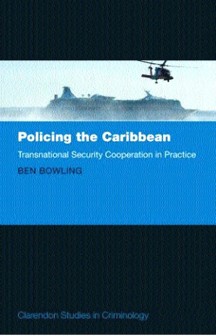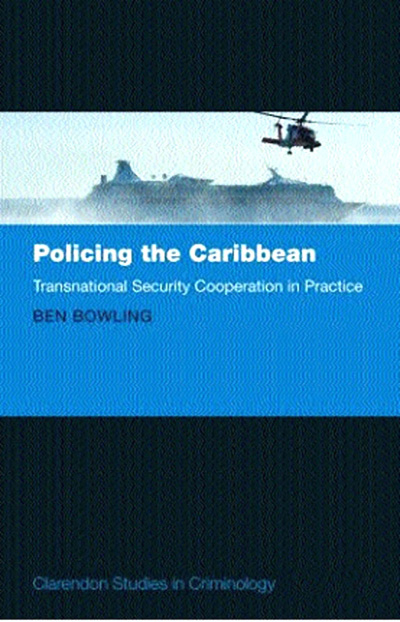This admirable book is a pioneering examination of the workings of the upper echelons of the policing family of the Commonwealth Caribbean in a comparative fashion. It raises a number of profound questions about the focus and effectiveness of much of this activity. This is not surprising as its central theme is the transformation of the police forces by the war on drugs. A police family has been created: services, the Coastguard and Customs chiefly, move from their original roles, fishery protection and search and rescue for the former and revenue protection for the latter, to policing the transit of cocaine through the Caribbean.
Bowling sets out his research questions and methods and the general security situation of the Caribbean in his first two chapters. Interviews with and observation of the Police Commissioners, Special Branch and Drugs Squad officers, senior officers in the Armed Forces and Coastguard, Custom officers and the British Drugs Liaison of Officers provide the solid foundations of this study. Bowling benefited from his deep knowledge of British policing and his background.
 His father is the artist Frank Bowling and some family members had been policemen. The general chapter does have the odd blemish: Haiti is a member of Caricom; the Leewards and Windwards are not the same (except, correctly, in the other official languages of the Caribbean); the USA mainly pursued fugitive slaves to Canada or Mexico in the 19th, not the 18th century; otherwise there is little to fault though I think he is overly optimistic that no one can discover the identities of his interviewees.
His father is the artist Frank Bowling and some family members had been policemen. The general chapter does have the odd blemish: Haiti is a member of Caricom; the Leewards and Windwards are not the same (except, correctly, in the other official languages of the Caribbean); the USA mainly pursued fugitive slaves to Canada or Mexico in the 19th, not the 18th century; otherwise there is little to fault though I think he is overly optimistic that no one can discover the identities of his interviewees.
The driving force of these transformations has been the war on drugs initiated by the United States of America. This has had at least some beneficial effects. The close cooperation among British West Indian police forces broke down with independence: regional cooperation has been strengthened by the security demands of recent decades. Training and more resources have improved the police family; attention has been focussed on the ways in which events faraway can affect the lives of people in the Caribbean. The dedication, professionalism, intelligence and nationalism of the interviewees come across clearly from Bowling’s descriptions and their own quoted words.
What have been the other aspects of this transformation? Intelligence is shared regionally, with specific countries and globally: this has often meant new techniques and some old but controversial ones (no Trinidadian reader would be unaware of recent revelations about wiretapping). Often sharing between members of the police family within a territory has proved more problematic than with foreign agencies.
New international legal agreements have been signed. The Shiprider ones with the USA have been those that sparked the greatest debate. Better communications equipment has been obtained and access to international networks improved. New items of equipment (if sometimes very used as with coastguard vessels for instance) have been delivered. The active participation of foreign members of the police family, most notably in the case of the United Kingdom Drugs Liaison Officers, has become commonplace, supplementing and advancing the expertise of Caribbean staff; vessels and aircraft of the armed forces especially of the USA and the UK take part in training exercises and operations.
Bowling’s central question in this book is whether this transformation has added to the security of the citizens in the Commonwealth Caribbean. The object of policing in a modern democratic state is the protection of the citizen and the citizen’s property. At least most citizens would assume so. Governments may have their own opinions about this: citizens might rightly or wrongly believe that governments seek to protect governments. There are overlapping common areas: a government would not be one if all its citizens met violent ends or lost their property. What are the global threats to citizens in the contemporary world?
As Bowling demonstrated the two threats emphasised- and the first is the overwhelming preoccupation- are the drugs trade and terrorism. Are there others? Moises Naim in Illict: How Smugglers, Traffickers and Copycats are Hijacking the Global Economy (2005) as the subtitle suggests identifies smugglers (of whom those in the drugs trade are only a part), people traffickers and the counterfeiters of goods, mostly dangerously perhaps fake medicines. Non-drug smuggling deprives governments of revenues to devote to the welfare of their citizens; people trafficking involves violence and degradation for the victims, whether citizens or not and should be regarded as an intolerable obscenity by any people anywhere, but especially those with a history of being enslaved. Counterfeiting of goods may actually kill if the goods are medicines, foods or electronic items. Were policing efforts concentrated on these threats citizens might be made safer.
What is clear from the interviewees is that they fully understand the effects of the war on drugs. They rightly point out that the Caribbean is involved because the region is on the trade routes to the USA and Europe. As the more direct routes for cocaine smuggling to the USA became more heavily policed the trade shifted; locally grown marijuana is a small fraction of the trade; local consumption is very low. So an activity which has to do with consumption in the USA and Europe affects the Caribbean and one of its effects is the increasing use of firearms to solve disputes directly related to the transit trade as well as those of domestic origin. The police become militarized in response; the defence forces are used more and more often in police operations and as we saw early this year in Kingston the arrest of a single man can lead to armed confrontations in a capital city. The sheer economic size of the drugs trade also serves to corrupt politicians, public servants, business people and ordinary citizens. In frail economies the drug trade provides employment.
In tackling the drugs problem the metropolitan countries understandably put their own interests first. The new structure of policing therefore has become distorted to suit their interests. “Imbalance” is a word that often appears in this book: the author and those who use it refer to imbalances in priorities, policies, resources and actions. The Caribbean interviewees are very clear about this, but so are most of the foreigners too. For the Caribbean ones there are also the issues of sovereignty: what does this mean in the contemporary world? The battle was fought over the Shiprider agreements with the USA. If not won, at least some pride was restored. Bowling sees this as an aspect of globalization which it is but it is also a particular version of globalization. The research was done in the Caribbean when the then dominant ideologues in the USA believed that they created reality and that the Westphalian settlement (basically the belief that all nations, whatever their size, are sovereign) was over and that there would be one world dominant superpower in the world. The Iraq and Afghan morasses and the consequences of believing in unregulated free markets had not yet been seen. Ideologues, however, have short memories and do not like their theories killed by facts
Bowling’s discussions of the need to develop new ethical foundations for this type of policing and a thorough understanding of the issues of sovereignty and accountability that arise are models of lucidity. There have been occasions when foreign police officers have exceeded their advisory capacities: the agreements under which they operate make the local governments liable for such actions. But what needs to be debated is the legalization of drugs. Bowling quotes Jock Young in 1971 predicting accurately what would happen; the American experience with the prohibition of alcohol should have been a cautionary tale. It ended by entrenching criminal organizations, not producing a teetotal nation. It could be ended because the vast resources invested in the war on drugs were never invested in it and the USA was in no position to make it global. Bowling points out that this war has made life more dangerous for people in the Caribbean and diverted attention from more pressing problems. Perhaps with more Latin American countries beginning to query its rationale and even the right wing Economist journal arguing for the end of criminalization there may be some hope. This book provides much food for thought if little comfort.
(Reprinted from December 2010 Trinidad and Tobago Review)










